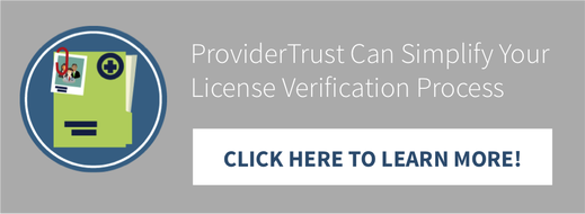What exactly is license verification? For a healthcare professional it is one of the most important documents that indicate a practitioner is legally qualified and up-to-date on state licensing board requirements or other primary sources.
License Verification and Monitoring
There are always those few outliers who try to “get around” the system or are actively scheming in fraudulent behavior to benefit themselves. Practicing without a license or under an expired or restricted license can have drastic financial, legal, and medical impacts on a healthcare organization. Ongoing nurse license monitoring is a best practice and preventable measure to combat against fraudulent activity, whether intentional or accidental and to protect your organization and patients from bad actors.
Fines and penalties can be issued to healthcare organizations who do not comply with rules and regulations from the HHS Office of Inspector General (OIG) and the Centers for Medicare and Medicaid Services (CMS) for the following reasons:
- Submitting claims from unlicensed physicians
- Submitting a claim for an individual that is not currently licensed
Submitting claims for both types of providers above can result in a false claims investigation, as well as additional fines or penalties including forced reimbursement for such billings.
State Healthcare Licensing Boards
A license that is issued by a state licensing board is proof that a healthcare professional has an existing license in order to practice. The verification process verifies and confirms the information about an individual’s license, which includes the license number, license type, jurisdiction, and expiration date.
In addition, for some professions (RN, LPN) primary source documentation may indicate if the license is a multi-state license, which allows the practitioner to provide care in other states that recognize the license and participate in the Nurse Licensure Compact.
Nurse License Verification Best Practices
Compliance Officers should always double check a few items to correctly verify their nurses and staff. First off, a comparison should be made with the nurse’s license and paperwork provided to the HR department. This quick step helps correctly identify that the individual is who they say they are, and they are qualified and trained for their job responsibilities and medical activities based on proper training and educational requirements.
Compliance Officers and Human Resouces professionals can prevent innocent patients from unimaginable risk and harm by following a consistent verification process and continuing to fine tune it over time. Having an effective system of checks and balances ensures that if the individual has altered, fabricated, or stolen someone else’s license, it will not match up with their personal identifying information.
Healthcare License Primary Sources
A healthcare license can be confirmed and verified at the primary source via the licensing board that issued the license. The board updates their databases monthly and will report disciplinary actions or limitations placed upon a license. The practitioner will typically be issued a hard copy license. This will have his/her photo and other identifying information. The photo ID is something the HR department or Compliance department should keep a copy of in the practitioner’s file.
Healthcare License Verifications and Exclusions Monitoring
An error in license tracking and verifying is a very real possibility, especially within large companies that have thousands of employees and vendors. The responsibility of verifying licenses and other required documents falls on the company that hires and contracts with licensed professionals. This means keeping up with license expiration dates, continuing education requirements, courses, fees paid, and license renewals.
The OIG added some clarity on who is responsible for verifying licenses and OIG exclusion monitoring when a staffing agency is used to fill nursing positions. HHS OIG confirmed that the ultimate responsibility for ensuring the person is properly licensed and not excluded falls upon the healthcare company that employs and bills the Centers for Medicare and Medicaid Services (CMS), despite the staffing agency’s referral.
When using a staffing agency to recruit and obtain new nurses, you should take the following into consideration:
- The staffing company has contractually agreed to perform OIG exclusion monthly monitoring as well as license verification from a primary source.
- The healthcare company that contracts with the staffing company conducts random and routine audits to ensure the staffing company is conducting these searches.
- The risk tolerance of the healthcare company is such that it should include the placed staff in its own monthly monitoring for safe measure.

Written by Michael Rosen, ESQ
ProviderTrust Co-Founder, mrosen@providertrust.com
Michael brings over 20 years of experience founding and leading risk mitigation businesses, receiving numerous accolades such as: Inc Magazine’s Inc 500 Award and Nashville Chamber of Commerce Small Business of the Year
Connect with Michael on Linkedin








